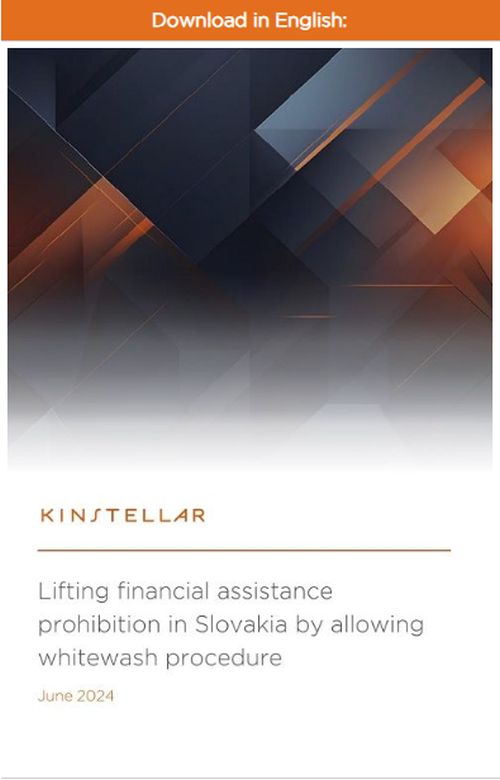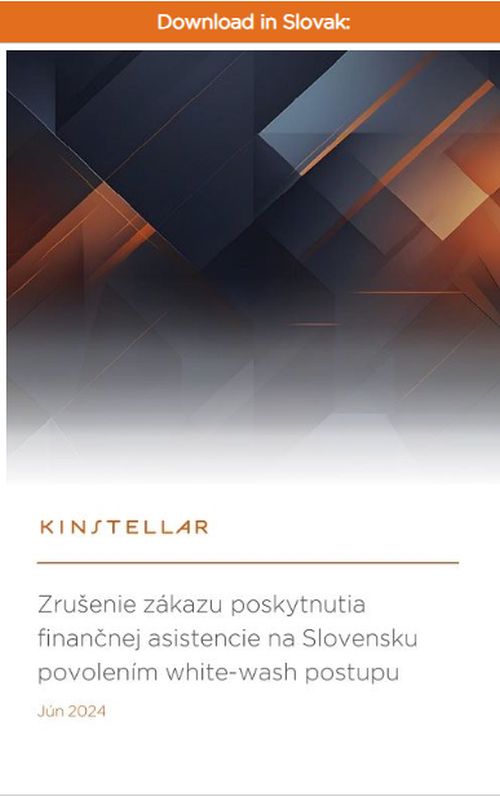June 2024 – Effective 1 March 2024, financial assistance, i.e., the so-called whitewash procedure, is allowed for joint-stock companies, subject to certain conditions. Previously, such financial assistance was completely prohibited for joint-stock companies. No other types of companies in Slovakia were subject to this limitation.
1. What is the whitewash procedure?
Financial assistance is defined as granting advance payments, loans or credits by a target company for the purpose of acquiring its shares and granting security by such company for this purpose.
The financial assistance rules apply also for establishment of pledge over the company's own shares as well as for acquiring, subscribing or establishing a pledge over the shares of the controlling person (parent company) by the controlled person.
In the context of the acquisition of shares of joint-stock companies, the complete prohibition of financial assistance in M&A transactions has been a major problem. In the process of acquiring a company, one of the most important issues is the question of its financing. Most often, either own financial resources (equity) or debt financing are used. Debt financing usually also involves the provision of security in the shares or assets of the target company.
Consequence of violation of the financial assistance prohibition was invalidity of the relevant act. Board of Directors of the company was liable for incompliance with financial assistance prohibition.
Below you can find legal requirements and conditions under which a joint-stock company may now provide financial assistance to a third party.
2. What are the whitewash procedure conditions?
Unless the Articles of Association provides for additional conditions, the following conditions must be met for provision of financial assistance:
- it must be explicitly permitted by the Articles of Association;
- financial assistance is provided on an arm's length basis – with special consideration given to the interest rate and security provided to the company granting financial assistance;
- the Board of Directors must examine the financial eligibility of the person to which or through which financial assistance is provided;
- the provision of financial assistance must not cause any decrease in equity capital below the value of subscribed registered capital plus funds (reserve fund and other funds that cannot be distributed among the shareholders) minus unpaid registered capital if it is not yet accounted for in the assets listed in the balance sheet, considering also the possible reduction of equity that may occur if the own shares are acquired by the company or another person acting on its behalf;
- the target company must create a special reserve fund in the amount of the provided financial assistance.
3. What is the biggest challenge?
The biggest practical challenge comes from the ambiguous obligation of the companies to create a special reserve fund in the amount of the financial assistance provided. The term of financial assistance is not defined and therefore it remains unclear what should be the amount of its creation. Would it be the amount of the loan / price the company is securing or the asset it is granting for security? Should the amount of the maximum secured claim be used?
Depending on the interpretation, the provision of financial assistance could become extremely expensive for the company.
The ambiguity of this provision causes limitations for companies and leads to practical assessments if the whitewash procedure should be applied (similarly to how the practice evolved in the Czech Republic).
4. What further steps are required to satisfy the whitewash procedure?
(i.) Approval of the provision of financial assistance by the general meeting (at least a two-thirds majority of votes of the present shareholders is required).
(ii.) The Board of Directors prepares a written report to the general meeting setting out the following:
- reasons to provide financial assistance;
- justification of the provision of financial assistance in the interest of the company;
- conditions for financial assistance;
- assessment of risks related to the financial assistance as to the company's liquidity and its ability to pay; and
- the purchase price for acquisition of shares by third person.
(iii.) The Supervisory Board prepares a written report to the general meeting setting out the following:
- whether the provision of financial assistance does not conflict with the best interests of the company;
- the correctness of the report of the Board of Directors, if the financial assistance is to be provided to a member of the Board of Directors, controlling person or a member of its statutory body or to a person acting in his own name, but on behalf of a member of the Board of Directors or a controlling person, or the supervisory board.
(iv.) Deposition of reports under (ii) and (iii) above to the Collection of Documents without undue delay after the approval of financial assistance at the general meeting.
5. Exceptions to financial assistance
The Commercial Code specifies exceptions to financial assistance, as follows:
- acquisitions of shares by employees of the company; or
- transactions within banks´ ordinary course of business.
A condition to applying the foregoing exceptions to the general rule is that the respective company's equity shall not fall below its registered share capital as a result of the financial assistance provided.
Click on one of the images below or click on the following links to download the article in English or in Slovak.
 |
 |
The content of this article is intended to provide a general guide to the subject matter. Specialist advice should be sought about your specific circumstances.



